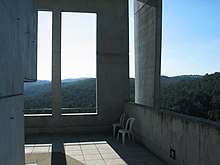French Institute for Research in Computer Science and Automation
The National Institute for Research in Computer Science and Automation (Inria) (French: Institut national de recherche en informatique et en automatique) is a French national research institution focusing on computer science and applied mathematics. It was created under the name Institut de recherche en informatique et en automatique (IRIA) in 1967 at Rocquencourt near Paris, part of Plan Calcul. Its first site was the historical premises of SHAPE (central command of NATO military forces). In 1980 IRIA became INRIA.[1] Since 2011, it has been styled Inria.
 | |
| Formation | 3 January 1967 |
|---|---|
| Type | Public |
| Purpose | Research |
| Headquarters | Rocquencourt, France |
| Fields | Computer science Applied mathematics |
Official languages | French, English |
President | Bruno Sportisse |
Budget | €235 million (2013) |
Staff | 1,772 researchers |
| Website | inria.fr |
Inria is a Public Scientific and Technical Research Establishment (EPST) under the double supervision of the French Ministry of National Education, Advanced Instruction and Research and the Ministry of Economy, Finance and Industry.
Administrative status

Inria has 8 research centers distributed along France (in Bordeaux, Grenoble-Inovallée, Lille, Nancy, Paris-Rocquencourt, Rennes, Saclay, and Sophia Antipolis) and one center abroad in Santiago de Chile, Chile. It also contributes to academic research teams outside of those centers.
Before December 2007, the three centers of Bordeaux, Lille and Saclay formed a single research center called INRIA Futurs.
In October 2010, Inria, with Pierre and Marie Curie University and Paris Diderot University started IRILL, a center for innovation and research initiative for free software.
Inria employs 3800 people. Among them are 1300 researchers, 1000 Ph.D. students and 500 postdoctorates.
Research
Inria does both theoretical and applied research in computer science. In the process, it has produced many widely used programs, such as
- Bigloo, a Scheme implementation
- CADP, a tool box for the verification of asynchronous concurrent systems
- Caml, a language from the ML family
- Caml Light and OCaml implementations
- ChorusOS, distributed operating system
- CompCert, verified C compiler for PowerPC, ARM and x86_32
- Contrail[2]
- Coq, a proof assistant
- Eigen (C++ library)
- Esterel, a programming language for State Automata
- Geneauto — code-generation from model[3]
- Gudhi — A C++ library with Python interface for computational topology and topological data analysis [4]
- Graphite, a research platform for computer graphics, 3D modeling and numerical geometry
- medInria, a medical image processing software, popularly used for MRI images.[5]
- OpenViBE, a software platform dedicated to designing, testing and using brain-computer interfaces.
- Pharo, an open-source Smalltalk derived from Squeak .
- Le Lisp, a portable Lisp implementation
- Scilab, a numerical computation software package
- scikit-learn, a machine learning software package
- SimGrid
- SmartEiffel, a free Eiffel compiler
- SOFA, an open source framework for multi-physics simulation with an emphasis on medical simulation.
- TOM, a pattern matching language
- ViSP, an open source visual servoing platform library
- XtreemFS[2]
- XtreemOS
Inria furthermore leads French AI Research, ranking 12th worldwide in 2019, based on accepted publications at the prestigious Conference on Neural Information Processing Systems.[6]
References
- (in French) Décret #79-1158 du 27 décembre 1979 Création d'un institut national de recherches en informatique et en automatique (INRIA), établissement public à caractère administratif, placé sous la tutelle du ministre de l'industrie.
- Versweyveld, Leslie (30 October 2012). "The Contrail project is proud to present its first complete set of interoperable Cloud federation tools". International Science Grid This Week (ISGTW). Archived from the original on 2013-10-17. Retrieved 17 October 2013.
- "Geneauto / P toolset - The P toolset includes a code generation and verification framework for the languages supported by the TOPCASED environment". Scilab.
- "Gudhi, INRIA".
- "medInria".
- "NeurIPS 2019 Stats".
Further reading
- Beltran, Alain; Griset, Pascal (2007). Histoire d'un pionnier de l'informatique: 40 ans de recherche à l'Inria [Story of a computer pioneer: 40 years of research at INRIA] (in French). EDP Sciences. ISBN 2-86883-806-5.